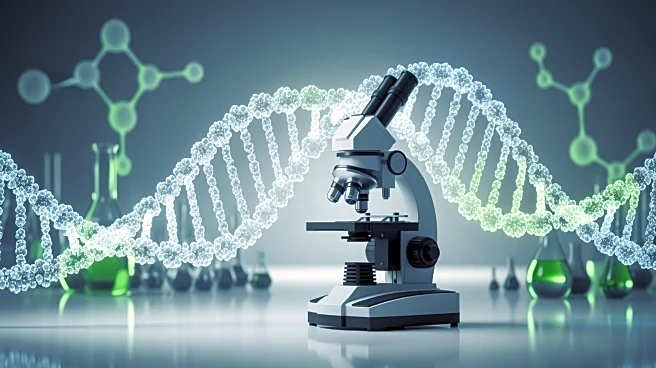What's Happening?
Swiss pharmaceutical company Novartis has announced its agreement to acquire U.S.-based biotechnology firm Avidity Biosciences for approximately $12 billion. The acquisition will see Novartis paying Avidity shareholders $72 per share in cash, representing
a 46% premium over Avidity's closing price on the previous Friday. The transaction is expected to finalize in the first half of 2026, following Avidity's planned spin-off of certain business segments, including its early-stage precision cardiology programs. Avidity is known for its development of RNA therapeutics, specifically antibody oligonucleotide conjugates, which are designed to modify gene expression to treat or prevent diseases. This acquisition aligns with Novartis's strategy to expand its research and development capabilities, particularly in the field of RNA-based therapies.
Why It's Important?
The acquisition of Avidity Biosciences by Novartis is significant as it underscores the growing interest and investment in RNA-based therapeutics, a cutting-edge area in biotechnology. This move is expected to bolster Novartis's pipeline of innovative treatments, particularly in muscle tissue-targeted RNA therapies. The deal also reflects Novartis's commitment to enhancing its U.S. infrastructure, as evidenced by its recent $23 billion investment pledge, which includes the establishment of a new R&D hub in San Diego. For Avidity, the acquisition offers an opportunity to leverage Novartis's extensive resources and expertise to accelerate the development and commercialization of its RNA therapeutic programs. The transaction is poised to impact the biotechnology sector by potentially setting a precedent for future mergers and acquisitions focused on advanced genetic therapies.
What's Next?
Following the completion of the acquisition, Novartis plans to integrate Avidity's RNA therapeutic programs into its existing research and development framework. The company has already adjusted its sales growth forecast, anticipating a compound annual growth rate increase from 5% to 6% between 2024 and 2029 as a result of the acquisition. Stakeholders in the biotechnology and pharmaceutical industries will likely monitor the integration process closely, as well as the potential for new RNA-based treatments to emerge from Novartis's expanded capabilities. Additionally, the acquisition may prompt other pharmaceutical companies to pursue similar strategies, potentially leading to increased consolidation within the biotech sector.
















